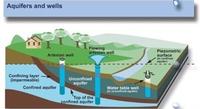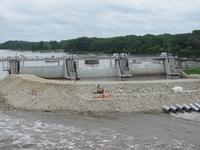-
Japan testing underground nuclear waste storage depot, despite local concerns
Data is being collected at the Horonobe Underground Research Center, in Horonobe, Japan to determine whether the site is able to begin storing radioactive waste in conditions which could last for 100,000 years.Japanese utility systems have produced more that 17,000 tons of “spent” nuclear fuel rods from power plants which are no longer useful but are expected to remain radioactive for around several thousand years.
-
-
Sewage treatment contributes to antibiotic resistance
Wastewater treatment plants are unwittingly helping to spread antibiotic resistance, say scientists. Researchers found that processing human, farm, and industrial waste all together in one place makes it easier for bacteria to become resistant to a wide range of even the most clinically-effective antibiotics. This is because so many different types of bacteria come together in sewage plants that it gives them a perfect opportunity to swap genes that confer resistance, helping them live. This means antibiotic-resistant bacteria are evolving much faster than they would in isolation.
-
-
First federal funds for West Coast earthquake warning system
Efforts by California officials to expand an earthquake warning system for the West Coast gained ground last Tuesday as the House Appropriations Committeerecommended $5 million — the first federal funds specifically for the project — toward the warning system. Analysts project the system will cost $38.3 million to build, and $16.1 million a year to operate and maintain. The $5 million would allow the purchase and installation of additional sensors and hiring of staff.
-
-
Researchers create safe, resistant material to store waste
Storing industrial waste has never been a pretty job, and it is getting harder. New techniques for refining such metals as aluminum and vanadium, for example, also yield new byproducts that have to be sealed away from human and environmental contact. Also, the practice of “scrubbing” the exhaust of coal-fired power plants keeps chemicals like sulfur dioxide from entering the air, but produces a more concentrated residue. Now, many of these wastes are proving too acidic, basic or concentrated for commonly used storage materials.
-
-
Groundwater reservoirs are being depleted at an increasing rate

The rate at which the Earth’s groundwater reservoirs are being depleted is constantly increasing. Annual groundwater depletion during the first decade of this century was twice as high as it was between 1960 and 2000. India, the USA, Iran, Saudi Arabia, and China are the countries with the highest rates of groundwater depletion. About 15 percent of global groundwater consumption is not sustainable, meaning that it comes from non-renewable groundwater resources. The increased use of groundwater for irrigation also results in a rise in sea levels, with roughly one tenth of the total sea level rise during the period from 2000 to 2009 due to groundwater depletion.
-
-
Japan exceedingly vulnerable to sea level rise
Scientists say that Japan might be one of the most at-risk nations when it comes to the consequences of sea-level rise.Japan has a coastline 30,000 km long, and much of it in largely low-elevation regions. Additionally, about 80 percent of the country’s industry and population are located in these zones.
-
-
Debate in Texas over fossil fuel-based economic growth
Texas officials tout the state’s economic growth, which is due in part to the state’s energy sector. That same energy sector puts Texas’ economy at risk in decades to come, with scientists saying that this economic growth comes at a high cost.State climatologist John Nielsen-Gammon, who was appointed by then-Governor George W. Bush, notes that the state is projected to be several degrees warmer and experience longer and more severe droughts. The see along portions of the state’s 367-mile Gulf Coast has already risen up to one foot in the past century.
-
-
Mapping Florida sinkholes
Sinkholes are common in Florida because of porous rock underground, such as limestone, which holds water. Over time, acid in the water dissolves the rock, creating a void. The Florida Geological Surveyand Florida Department of Emergency Managementare making progress on creating a statewide map showing where sinkholes are most likely to form. Florida received more than $1 million in federal funding last year to conduct a three-year study which would eventually help emergency planners predict where sinkholes are likely to develop, especially after large rainstorms.
-
-
New materials, designs needed to fortify infrastructure against extreme weather
As cities prepare for the effects of climate change, higher temperatures for longer periods of time and a dramatic change in humidity and rainfall pose the highest risk to public infrastructure, scientists say. Buildings, roads, and bridges which were built for one set of climate conditions will have to function in another. Researchers say that analysis of changing conditions in Alaska, for example, shows that in thirty or forty years the state would have to rebuild roads every eighteen months unless new designs and materials were adopted.
-
-
Silicon Valley braces for floods, storm surges caused by sea level rise
A new analysis found that $36.5 billion in property and at least 145,000 California residents could be directly affected in the next thirty years from flooding caused by sea level rise. San Mateo County, home to major corporations including Facebook, Oracle, and Genentechin Palo Alto, and the low-income population of East Palo Alto, would be the most affected.
-
-
Earthquake researchers get online primer for simulation method
Researchers now have access to expert instruction for an emerging simulation method to study seismic effects on structures and to design buildings that better withstand strong earthquakes. The National Science Foundation’s (NSF) George E. Brown Jr. Network for Earthquake Engineering Simulation (NEES) is providing a primer on its NEEShub. he primer explains how to use hybrid simulations, methods that are helping researchers study the effects of earthquakes on buildings and other structures.
-
-
Design standards for dams are effective for earthquakes: study
There has long been a concern among civil engineers that dams could fail days or weeks after an earthquake, even if no immediate evidence of a problem surfaced. Their concern has focused on possible cracks at the interface between the concrete section of a dam and the soil embankments at the dam’s sides, and on how the soil filters nestled amidst the embankments would fare. Soil filters consist of coarser grain soils than the soil used in the dam’s impervious core, and their purpose in the event of a crack in the soil, is to prevent the finer core soil particles from rapidly eroding and flushing through the filter. Since soil filters were instituted, their design standards have been based on experimental studies without detailed and validated computer modeling of the soil grains — until now.
-
-
Assessing the damage of runaway barges at the Illinois River lock and dam

It takes a synchronized lock and dam system — operating like a motorized flight of stairs on the Illinois River, using gravity to move the water — to maintain a minimum depth for boat traffic. A disastrous domino effect occurred on 19 April 2013, when heavy rain and runoff, strong winds, and river currents resulted in seven unmoored barges crashing into the dam at Marseilles, Illinois. Researchers say that the system of locks and dams on the Illinois River is vulnerable to changing climate and weather extremes. These more frequent and unpredictable conditions can cause shipping accidents, damage to lock and dam systems, streambank erosion, shipping accidents, and local flooding.
-
-
Los Alamos lab admits mishandling toxic waste, causing repository radiation leak
In a letter addressed to the New Mexico Environment Department (NMED), lab officials at Los Alamos National Laboratory (LANL) have admitted to mishandling toxic waste shipped to the Waste Isolation Pilot Plant (WIPP) in Carlsbad, New Mexico, the nation’s only permanent repository for plutonium-contaminated waste from government nuclear facilities.
-
-
Seattle builds resiliency in the face of changing climate
The federal government’s National Climate Assessment, released in May, detailed the region-by-region effects which includes water shortages, sea-level rise, and more frequent wildfires. Most American cities fall short on climate change preparation when compared to several major cities around the world. A survey conducted by MIT reported that globally, “the U.S. has the lowest percentage of cities engaged in (climate change) assessments and planning.” Seattle has decided it needs to act, and act now, to make itself more resilient in the face of a changing climate.
-
More headlines
The long view
Water Wars: A Historic Agreement Between Mexico and US Is Ramping Up Border Tension
As climate change drives rising temperatures and changes in rainfall, Mexico and the US are in the middle of a conflict over water, putting an additional strain on their relationship. Partly due to constant droughts, Mexico has struggled to maintain its water deliveries for much of the last 25 years, deliveries to which it is obligated by a 1944 water-sharing agreement between the two countries.
Trump Is Fast-Tracking New Coal Mines — Even When They Don’t Make Economic Sense
In Appalachian Tennessee, mines shut down and couldn’t pay their debts. Now a new one is opening under the guise of an “energy emergency.”
Smaller Nuclear Reactors Spark Renewed Interest in a Once-Shunned Energy Source
In the past two years, half the states have taken action to promote nuclear power, from creating nuclear task forces to integrating nuclear into long-term energy plans.
Keeping the Lights on with Nuclear Waste: Radiochemistry Transforms Nuclear Waste into Strategic Materials
How UNLV radiochemistry is pioneering the future of energy in the Southwest by salvaging strategic materials from nuclear dumps –and making it safe.
Model Predicts Long-Term Effects of Nuclear Waste on Underground Disposal Systems
The simulations matched results from an underground lab experiment in Switzerland, suggesting modeling could be used to validate the safety of nuclear disposal sites.
